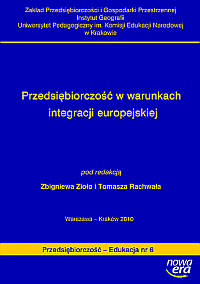Wykorzystanie swobód wspólnego rynku Unii Europejskiej przez młodych Polaków
DOI:
https://doi.org/10.24917/20833296.6.42Słowa kluczowe:
wspólny rynek, UE, młodziAbstrakt
The internal market of the EU comprises an area with no internal borders, in which a free flow of persons, goods, services and capital has been introduced. Among the main aims of creating the common market were: lowering of prices and their turnover, an increase in availability and competitiveness of services and making unrestricted movement within the union possible. This was aimed to enhance living standards among citizens of member states.Polish citizens are now enjoying these freedoms. As a teacher of entrepreneurship, I am interested mainly in entrepreneurship among young people, and in this particular case, in the way they are taking advantage of the opportunities created by Poland’s accession to the EU. In order to become better acquainted with the opinions of young Poles’ on the above mentioned topics, a survey was conducted among my secondary school students. As a result, I learned about the plans of secondary school final year students concerning further education or the search for employment, including the possibility of finding work abroad. Similar research was conducted in 2006 and 2007, presenting the opportunity to compare the results. The most important conclusions resulting from the comparison are the following: the students are closely following the economic situation of Poland and the EU, and are adapting their plans according to the changes currently taking place.Bibliografia
Blewąska J., Pienias M., 2005, Praktyki nie dla studentów, „Gazeta Wyborcza”, 13.06.2005.
Dyrektywa Rady 68/360/EWG w sprawie zniesienia ograniczeń w przemieszczaniu się i pobycie pracowników Państw Członkowskich i ich rodzin we Wspólnocie, 1968.
Dyrektywa Rady 73/148/EWG w sprawie zniesienia ograniczeń w zakresie przemieszczania się i pobytu obywateli Państw Członkowskich wewnątrz Wspólnoty, które dotyczą przedsiębiorczości i świadczenia usług, 1973.
Rola przedsiębiorczości w aktywizacji gospodarczej, seria „Przedsiębiorczość – Edukacja”, nr 3, 2007, Zioło Z., Rachwał T. (red.), Zakład Przedsiębiorczości i Gospodarki Przestrzennej Instytutu Geografii AP w Krakowie, wydawnictwo Nowa Era, Warszawa–Kraków.
Sołoma L., 2002, Metody i techniki badań socjologicznych, Wyższa Szkoła Pedagogiczna, Olsztyn.
Traktat ustanawiający Wspólnotę Europejską, 1957.
www.ukie.gov.p
Pobrania
Opublikowane
Jak cytować
Numer
Dział
Licencja
Artykuły publikowane są zgodnie z warunkami licencji Creative Commons (CC BY-ND 4.0; uznanie autorstwa-bez utworów zależnych).

